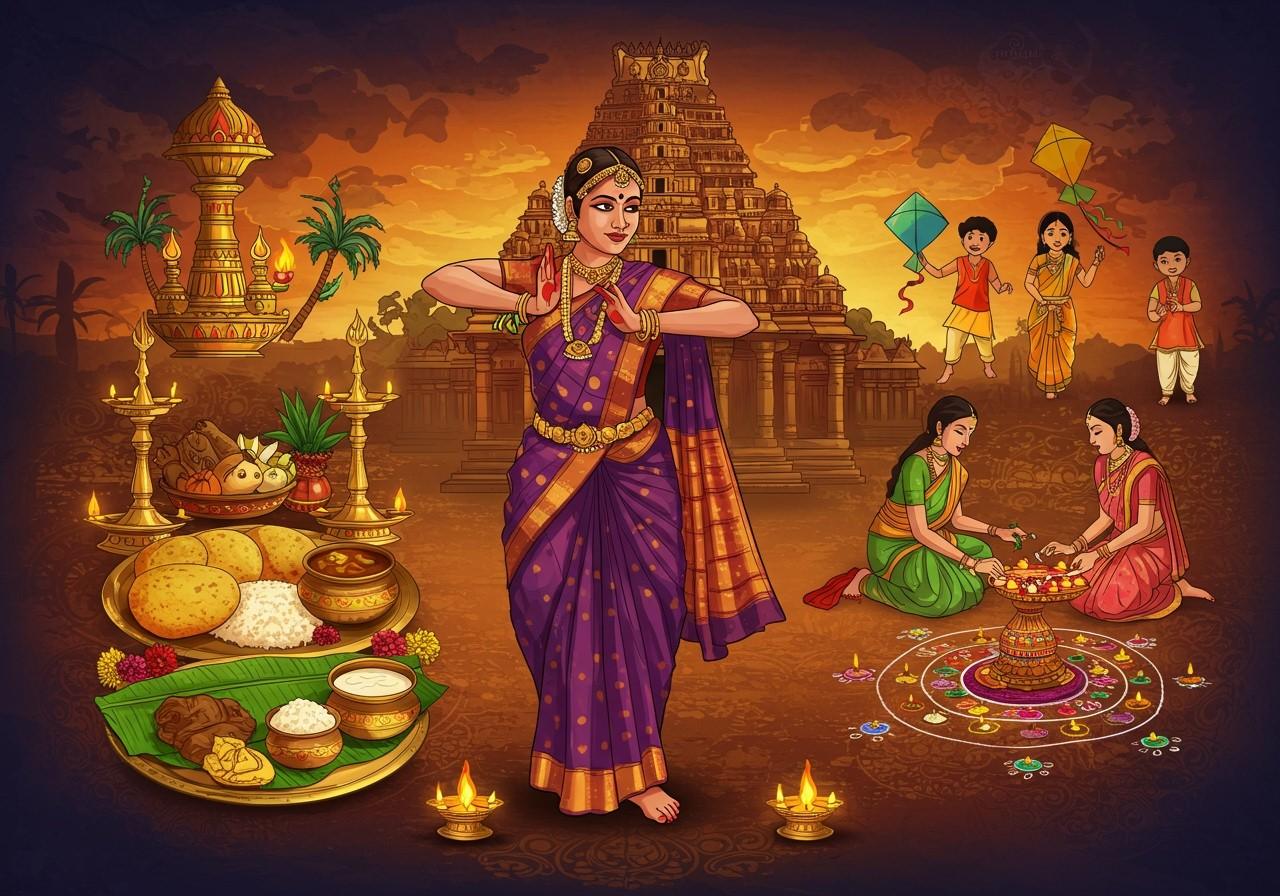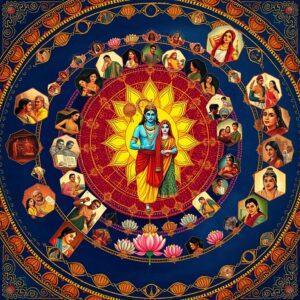
Telugu culture, originating from Andhra Pradesh and Telangana in South India, is a vibrant blend of traditions, festivals, and delectable cuisine. This blog delves into the distinctive ways Telugu people celebrate their major festivals, the traditional foods that define their culinary heritage, and the customs passed down through generations.
Pongal: A Harvest Festival
Pongal, a harvest festival celebrated with immense enthusiasm, marks the beginning of Uttarayana, the sun’s northward journey. The four-day festival includes:
- Bhogi: The first day focuses on new beginnings. Old items are discarded, houses are cleaned and decorated with rangoli (muggu), and a bonfire symbolizes the letting go of the past.
- Surya Pongal: The second day is dedicated to the Sun God. Freshly harvested rice, milk, and jaggery are cooked into ‘Pongal’ and offered to Surya, expressing gratitude for a bountiful harvest.
- Mattu Pongal: The third day honors cattle, essential partners in agriculture. Cows and bulls are adorned with garlands, their horns painted, and they are fed special treats, acknowledging their contribution to the harvest.
- Kanuma: The fourth day centers around family reunions and feasts. Traditional games and activities create a joyous atmosphere as people express gratitude for the harvest’s blessings.
Sankranti: Welcoming the Sun’s Journey
Sankranti, often coinciding with Pongal, celebrates the sun’s transition into Capricorn. This festival includes:
- Preparation: Homes are cleansed and decorated with muggu (rangoli), and freshly harvested grains are used to prepare special dishes, signifying a fresh start.
- Bhogi Panduga: Mirroring Pongal’s Bhogi, this day involves discarding old items and lighting a bonfire, symbolizing the transition from old to new.
- Pedda Panduga: The main Sankranti day is filled with feasting and community gatherings. Dishes like pulihora (tamarind rice) and ariselu (sweet rice cakes) are savored, strengthening community bonds.
- Kanuma: Cattle are worshipped and processions are organized. Farmers express their appreciation for their livestock’s role in the harvest.
- Mukkanuma: The final day is dedicated to family outings, picnics, and social gatherings. Special non-vegetarian dishes are prepared, and rural sports and activities add to the festive cheer.
Telugu Cuisine: A Culinary Tapestry
Telugu cuisine, known for its spicy and flavorful dishes, showcases the region’s rich culinary heritage.
Staple Foods, Breakfast, and Snacks
Dishes like pacha pesara pappu (green moong dal) are a common sight. Rice is the staple, often accompanied by lentils, vegetables, and pickles. Breakfast includes idli, dosa, and pesarattu, sometimes served on banana leaves. Snacks like mirchi bajji, garelu, and punugulu add a delightful crunch.
Main Courses and Desserts
Main courses feature biryani, gongura mutton, and kodi kura. Desserts like payasam, pootharekulu, and bobbatlu are enjoyed during festive occasions.
Cooking Techniques, Spices, and Ingredients
Telugu cuisine employs boiling, roasting, frying, and steaming. Esaru Annam, a nutritious dish, uses water from cooking rice. Spices like mustard seeds, cumin, curry leaves, and chilies are common, along with tamarind and coconut.
Traditional Customs: A Legacy of Respect and Reverence
Telugu culture is deeply rooted in traditions and customs, reflecting respect and reverence.
- Namaskaram: A respectful greeting with a bow and folded hands.
- Mangala Harathi: Offering light to deities during prayers, symbolizing the dispelling of darkness.
- Bathukamma: A floral festival celebrating nature and womanhood.
- Ugadi: The Telugu New Year, marked by the preparation of ‘Ugadi Pachadi,’ representing life’s varied experiences.
- Marriage Customs: Traditional weddings involve rituals like Kanyadaan, Mangalsutra tying, and Saptapadi.
- Dress Code: Traditional attire includes sarees for women and dhotis for men, often worn during festivals.
- Language and Literature: Telugu language boasts a rich literary heritage, including the epic ‘Mahabharata’ translation.
Poojn.in: Supporting Your Telugu Cultural Journey
Poojn.in offers a wide range of products for Telugu festivals and traditions, including pure copper kalashas, organic turmeric (pasupu), premium rice (akshintalu), brass and silver diyas, natural camphor (karpuram), incense sticks, puja flowers, and garlands. For Telugu cuisine, Poojn.in offers high-quality green moong dal, pure ghee, rock sugar (kalkandu), and dry fruits.
Poojn.in provides quality-certified products with doorstep delivery across India, supporting Telugu families in maintaining their cultural practices. Bulk orders are available for community events and temple ceremonies.
Conclusion
Telugu culture is a vibrant tapestry of traditions, festivals, and cuisine. From Pongal and Sankranti to the rich flavors of Telugu dishes, the culture embodies respect for nature, heritage, and togetherness. These customs foster a sense of belonging and offer a glimpse into the warmth and hospitality of Telugu people.


